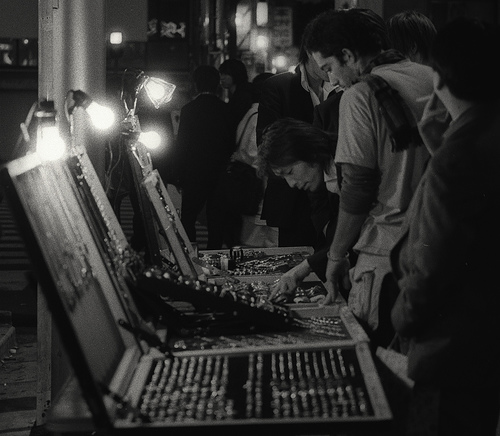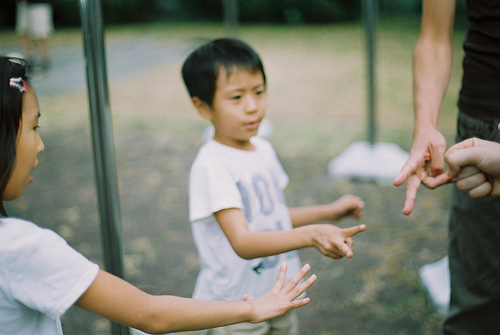
“Okay, Tommy, you know the business, right? You get 40% of what you sell. If someone steal something from your stall, you pay. Now look, what we do is not legal. The police catch you – you don’t have a boss. You don’t know me. You want to stop working – you tell me two weeks before. You’ll make good money.”
Sagi was a heavy Libyan-Israeli who ran a string of stalls on the streets of Tokyo selling silver rings, fake Rolex watches and Winnie the Pooh bears. I had run away from teaching English in South Korea to sell trinkets to the Japanese like a 21st century Colombus and was beginning to think that this was another fine mess I had got myself into.
The next three days were dedicated to my training as Christmas was coming and there was no time to lose. I was taken around to see each of the workers and learn something from their style. Each of them had five folding tables lit up with light bulbs that clipped onto the display cases. A generator hummed nearby and the overall effect was brash and shiny in the dark, cold streets. Everyone was dressed in at least three layers and hopped about from one foot to the other to stay warm.
Eli was my first teacher – a tall, wiry man with a moustache he resembled a wolf eying up straggelers in a herd. He looked me up and down and asked:
“So, are you Jewish?”
“No.”
“Never mind. Nobody’s perfect.”
While some sellers made a policy of staying behind their stalls so as not to scare away the timid Japanese, Eli saw selling as a contact sport. His stall was in the centre of downtown Ikebukuru and it faced a crossing on a busy shopping street; every time the lights changed 500 potential buyers hurried across to where he lay in wait. I arrived in time to see Eli hit a teenager on top of the head with an inflatable hammer. Eli laughed and slapped the boy on the back, dragging him over to his stall and his friends followed. Even if he couldn’t embarrass them into buying something, other Japanese soon came once they saw other people at the stall.
“These people are animals. Like sheep.” Eli told me with a glint in his eye. “If you want to sell you must be like a wolf. You go and grab them.”
I tried to get into the spirit of things and grabbed hold of a man in a suit and pulled him over. He shook free, apologising and never even made eye contact. I had more luck with some teenagers in hip-hop clothing but had no idea what to do once I got them near the merchandise. They too slipped away.
“You’re too nice.” Eli told me, shaking his head. “If you want to do this job you need to be the bad guy.”
Where the fuck was I? Who were these people? Why did I leave my cushy job in South Korea to sell fake goods on the street? It just wasn’t in my nature to bully people into buying stuff and I went home depressed. What on earth was I doing with this bunch of sharks?
Everyone working on the basta (Hebrew for ‘stall’), considered the Japanese to be a bunch of rich suckers. No one was here for a cultural exchange. The entire motivation of every Israeli working on the basta was to fill their pockets and go. The entry stamp lasted three months and you had to make every day count. When I asked the Israelis what they thought of the Japanese the answer was invariably the same.
“They’re stupid.”
At first I took this to be bigotry but after a few weeks of working with them I was saying the same thing. Really, though, the Japanese weren’t stupid, just gullible and naïve. They picked up stainless steel bracelets and asked:
“This real silver?”
“Of course it is – look how it shines!” they’d be told and they’d hand over 20 or 30 bucks for some worthless trinket. The Japanese had rarely encountered bare-faced lies and treachery before and had evolved no defence against it. It was like watching the Incas die of the imported common cold.
After that I rarely saw Sagi. He left the running of my basta to Dudu, his deputy manager. Dudu was an athletic Spanish-Moroccan Israeli with white skin and jet black hair. He was a childhood friend of Sagi and had been in Japan for three years. Like Sagi he had no education to speak of but was street smart and spoke fluent Spanish, Hebrew, English and Japanese.
Dudu was a tough guy with a nice side to him that kept catching me off-guard. At times he treated me almost like a kid brother, patronising me when I made mistakes and defending me against Sagi. He liked to see the good side in people but when he turned on them he could be ruthless. He was a guy with a good nature in a bad business and I guessed he’d grown up learning to fight his corner.
In the beginning he told me something that made me wish I had never come to Japan, putting his cell phone away and smiling.
“Eli has found a girl. Maybe I’ll have time to get there too.”
“What do you mean?”
“When one of us finds a Japanese girl he calls the rest before he gets to the love hotel. When he’s finished the next one goes in. What are you making that face for? You don’t understand, Tommy – the girls here like it! If they didn’t they would say something. Most of them are whores anyway.” he added defensively. He knew full well that the Japanese were too embarrassed to say no. But like many Israelis, he’d grown up learning that if you didn’t stand up for yourself then you deserved all you got.
Dudu showed me how to work the generator, set up the lights and then he meticulously arranged my basta, explaining the importance of keeping the rows of bracelets neat and orderly. It suited the Japanese mentality, he said. He climbed back in the tiny, oblong van:
“Go take all their money!” he laughed and drove away.
On My Own As a Street Merchant
Alone in the street with 5 tables of glossy jewellery I felt absolutely ridiculous. Who was ever going to buy anything from me? How was I going to look someone in the eye and tell them that all they really needed was this fake Rolex watch? Or tell some girl that she looked cute with a silver ring on her little finger? In these early days I had no idea to what depths I would fall.
The street felt tacky and remote in the Christmas lights and the Japanese shoppers came and went, ignoring me completely. When one of them did stop I had no idea what they were saying and in the dead moments I practiced my sales pitch under my breath. Nearby, a Kentucky Fried Chicken outlet had a television set outside that played the same nauseating jingle every minute and 47 seconds. Each time it began I was reminded that I still hadn’t sold anything.
In my first five days I had made 25 bucks for myself and was plunging fast into the red. I spent 10 hours a day begging the customers to buy something and cursing myself for having come here in the first place. I was stuck at the end of the world. The Japanese were all mindless robots, the Israelis a bunch of crooks and I was the worst salesman in the world. I cried for hours beside my stall and Dudu had only to see my expression at the end of the day to know how little I’d sold.
Then, after a week, I suddenly had a day when I made $150. I’d been pestering the older hands for the tricks of the trade and now it seemed to be paying off. You had to begin very quietly and build up to make a big deal of the customer when he put something on. You had to disorient him and move him around the stall. You had to forget about how much your crap stock was really worth and pick a high number out of the blue. If he demurred you made him a special ‘friend’ price but you had to close the deal quickly before he changed his mind.
If a customer argued about the price of a watch you could often tip the scales in your favour by offering to throw in a cotton friendship band, just for him. Incredibly, the prospect of a purple piece of string would often induce him to cough up the $150 for the watch. And if you had a stubborn customer who refused to meet your price then you saved face by playing your last card.
“Let’s play junken!”
The ancient game of strategy and honour known in the West as scissors, paper and stone.
“You know junken?” they’d respond, laughing.
“Sure. Now if you win you pay 14,000. If I win 17,000. Okay!” Before they could protest I began exaggerated athletic warm-up mode, stretching my wrists and taking deep breaths. We’d throw and if I was particularly desperate I looked to see what they were throwing in mid-air. Everyone from old ladies to students to salarymen were delighted to play junken and almost all of them had the grace to pay up when they lost. And of course if one of them looked sad afterwards I’d cheer them up by making them a present of a small piece of coloured string.
“Really?” they cried, their eyes shining with gratitude.
Throughout my time in Asia merchants had pissed me off with their repetitive sales pitches: Hello? Come look my things? Looking is free – I make special price just for you! And here I was mouthing the same patter by rote. It was too cold on the street to study Japanese and I had to keep an eye on customers coming to the stall. Hence in 3 months in Tokyo, I learnt how to explain the difference between a battery-powered and an automatic watch. But ask me how old I was or where I came from and I was stuck.
The Christmas season was coming and I was moved to Ikebukuru, not far from where Eli bullied his customers into parting with their yen. Business was booming and on the first day I made $230. $30 more than Eli. When he found out that evening he looked me up and down again with suspicion.
“You’re sure you’re not Jewish?”
“Yup.”
“Then how come you’re so smart?”









